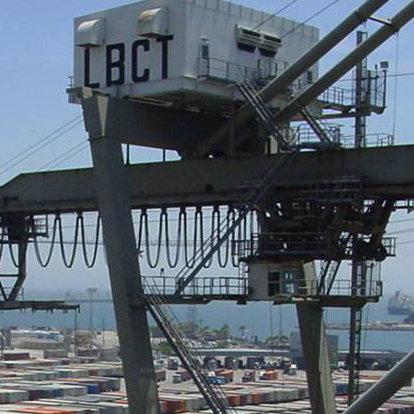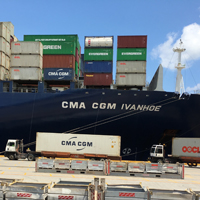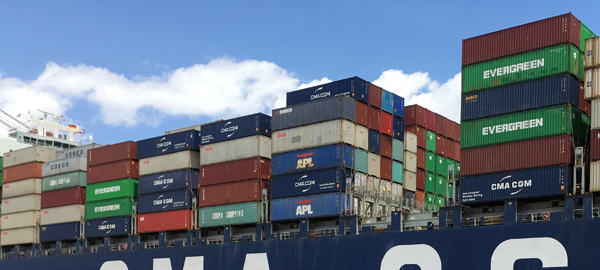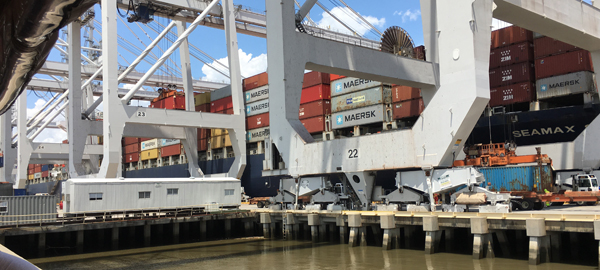
FTZ’ine March 2022
March 1, 2022
FTZ’ine May 2022
May 3, 2022No Foolin'
The US economy added over 430,000 jobs last month. That is not a misprint - the pace of recovery from the pandemic has been robust in the United States. The war in Ukraine has made it impossible for Europe to join in that economic growth, however, and despite signs that warfare may be abating, millions of homeless, unemployed refugees from yet another conflict are likely to stymie recovery efforts in Europe for quite some time.
As you can see above, flags at the Capitol were at half-staff last month after the passing of Madeleine Albright, the first woman to serve as Secretary of State of the United States. As Madam Secretary during the Clinton administration, she created and deployed American foreign policy in regional conflicts in Bosnia, Kosovo, Haiti, Northern Ireland and the Middle East. An accomplished linguist, she spoke Czech, Polish, French and Russian.
This year’s cherry blossoms persevered through wind and rain to put on an amazing show, and crowds were back in DC to enjoy them. Also persevering in March were Ukrainian forces, with the help of some sophisticated weapons from western allies. Their inspiring resolve has forced Russia to completely rethink its war strategy.

Top Story: US Economy Defying Ukraine’s Gravitational Pull – So Far
Tech Tip: E214 Validation of MID Coming Soon!
Have you ever had an entry summary reject due to invalid MID and then been up against the clock to get your entry summary accepted? The process of getting the MID added to ACE in time for your Entry Summary to get validated by 10th day after your entry submission can be stressful, and so you may have wondered why the MID wasn’t caught as invalid when you used it when admitting the goods on an e214. Now it will.
CBP announced in CSMS #51376733 - Enhanced e214 MID validation to be deployed to production on 4/4/2022 that the MID will once again be validated on e214 submissions. Over the years, since the inception of the e214, MID validation has been turned on and off. Some FTZ management software provides ability to file 214s but not to create MIDs, as MID creations is sometimes offered only in full brokerage packages. If your zone is in this situation, having an invalid MID caught at the 214 filing will mean getting a broker to set up the MID so the 214 will be accepted.
If you are unsure if your software allows for MID creation, ask your provider.
If you have questions about MID validation on the 214, please email us at Info@iscm.co.


Nervous On The Docks
USMCA Faces Test Over Mexico Power Projects


Forced Labor Prevention Act Creeps Closer To Implementation
Evergreen Line Spreading Cost Of Grounded Vessel To Importers


TRQ Handling Implemented For Japanese Steel, UK On Deck

FTZ Staff Activity
- FTZ Board Staff processed a Minor Boundary Modification (S-26-2022) in FTZ 18G on behalf of Tesla, Inc., in Stockton, CA, on February 25, 2022
- FTZ Board Staff processed a Termination (S-27-2022) in FTZ 32 in Miami, FL, on February 28, 2022
- FTZ Board Staff processed a Minor Boundary Modification (S-28-2022) in FTZ 151F on behalf of Supreme Resources, Inc., in Lima, OH, on February 28, 2022
- FTZ Board Staff processed a Minor Boundary Modification (S-29-2022) in FTZ 8 on behalf of TEC Wiring International, in Perrysburg, OH, on March 1, 2022
- FTZ Board Staff processed a Minor Boundary Modification (S-30-2022) in FTZ 163I on behalf of Destileria Serralles, in Ponce, PR, on March 2, 2022
- FTZ Board Staff processed a Minor Boundary Modification (S-31-2022) in FTZ 26P on behalf of Kubota North America Corporation, in Conley, GA, on March 9, 2022
- FTZ Board Staff processed a Minor Boundary Modification (S-32-2022) in FTZ 25F on behalf of South Florida Materials Corporation, dba Vecenergy, in Hollywood, FL, on March 10, 2022
- FTZ Board Staff processed a Minor Boundary Modification (S-33-2022) in FTZ 202 on behalf of lnterport Logistics, LLC, in Commerce, CA, on March 10, 2022
FTZ Board Activity
- Fluvitex USA, Inc. received authorization of limited production activity for quilts, comforters and cushions within FTZ 138 in Groveport, Ohio. MORE
- Plaquemines Port, Harbor & Terminal District submitted an application for a new foreign-trade zone under the alternative site framework in Plaquemines Parish, Louisiana. MORE
- Pfizer, Inc. submitted a notification of proposed production activity for lipid active pharmaceutical ingredients within FTZ 43 in Kalamazoo, Michigan. MORE
- Gulf Coast Growth Ventures LLC received authorization of production activity for ethylene, polyethylene, monoethylene glycol and related co-products within FTZ 122 in San Patricio County, Texas. MORE
- Innovusion, Inc. received authorization of production activity for light detection and ranging systems within FTZ 18 in Sunnyvale, California. MORE
- Lam Research Corporation received authorization of production activity for additional components of wafer fabrication equipment, subassemblies, and related parts within FTZ 18 in Fremont, Hayward, Livermore, Newark, and Tracy, California. MORE
- Avaya, Inc. received authorization of production activity for kitting of audio/video conferencing equipment within FTZ 262 in Olive Branch, Mississippi. MORE
- GXO Logistics received authorization of production activity for thermal transfer printers, data transmission devices and accessories kitting within FTZ 41 in Kenosha, Wisconsin. MORE
- Sunlit Arizona LLC submitted a notification of proposed production activity for specialty chemicals for microchip production within FTZ 75 in Phoenix, Arizona. MORE
- BrightView Technologies, Inc. received authorization of production activity for plastic film within FTZ 93 in Durham, North Carolina. MORE
- Swafford Warehousing, Inc. received authorization of production activity for medical kits within FTZ 38 in Greer, South Carolina. MORE
- Aker Solutions, Inc. received authorization of production activity for subsea oil and gas systems within FTZ 82 in Mobile, Alabama. MORE
- Pfizer, Inc. submitted a notification of proposed production activity for nirmatrelvir active pharmaceutical ingredient (API) for COVID-19 treatment within FTZ 43 in Kalamazoo, Michigan. MORE
- GHSP Inc. submitted an application for subzone status for its facility within FTZ 189 in Grand Haven, Hart and Holland, Michigan. MORE
- The Greater Kansas City Foreign-Trade Zone, Inc. received approval for the reorganization and expansion of the service area and new magnet site of FTZ 15 under ASF in Kansas City, Missouri. MORE

No Foolin’ –
The US economy added over 430,000 jobs last month. That is not a misprint – the pace of recovery from the pandemic has been robust in the United States. The war in Ukraine has made it impossible for Europe to join in that economic growth, however, and despite signs that warfare may be abating, millions of homeless, unemployed refugees from yet another conflict are likely to stymie recovery efforts in Europe for quite some time.
As you can see above, flags at the Capitol were at half-staff last month after the passing of Madeleine Albright, the first woman to serve as Secretary of State of the United States. As Madam Secretary during the Clinton administration, she created and deployed American foreign policy in regional conflicts in Bosnia, Kosovo, Haiti, Northern Ireland and the Middle East. An accomplished linguist, she spoke Czech, Polish, French and Russian.
This year’s cherry blossoms persevered through wind and rain to put on an amazing show, and crowds were back in DC to enjoy them. Also persevering in March were Ukrainian forces, with the help of some sophisticated weapons from western allies. Their inspiring resolve has forced Russia to completely rethink its war strategy.

